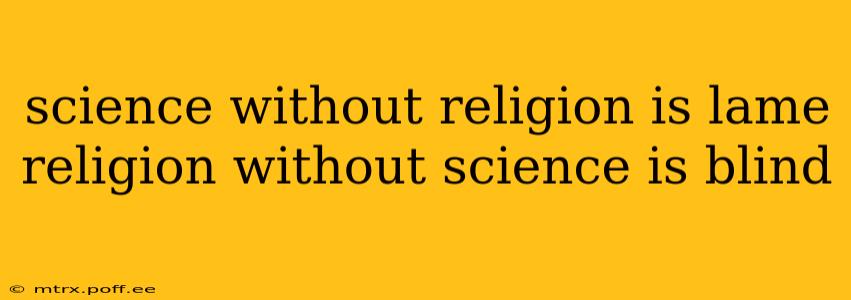Science Without Religion Is Lame, Religion Without Science Is Blind: Exploring the Interplay of Faith and Reason
The famous quote, "Science without religion is lame, religion without science is blind," attributed to Albert Einstein, sparks a continuous debate about the relationship between faith and reason. While often simplified, the statement highlights a crucial point: a balanced worldview benefits from both scientific inquiry and spiritual contemplation. This exploration delves deeper into this complex interplay, examining how science and religion can inform and enrich each other, and addressing common misunderstandings.
What Did Einstein Actually Mean?
Einstein's quote isn't a call for a literal merging of science and religion, where scientific findings dictate religious dogma or vice-versa. Instead, it suggests a synergistic relationship. A purely scientific worldview, ignoring ethical considerations and the deeper questions of existence, can feel incomplete – "lame." Conversely, a faith-based system that disregards scientific evidence and reason can be misguided and potentially harmful – "blind." The strength lies in the thoughtful interaction between these two distinct but not necessarily opposing perspectives.
How Does Science Inform Religion?
Science provides a framework for understanding the natural world. This understanding can enrich religious perspectives in several ways:
- Expanding our comprehension of creation: Scientific discoveries about the vastness of the universe, the complexity of life, and the intricacies of the natural world can deepen our awe and appreciation for the creative power often attributed to a divine force. The sheer elegance of scientific laws can be seen as a reflection of divine order.
- Refining theological interpretations: Scientific findings can challenge outdated or literal interpretations of religious texts. For instance, evolutionary biology has led to reinterpretations of creation narratives in many religious traditions. This doesn't necessarily diminish faith, but rather refines our understanding of how God or a higher power might operate within the universe.
- Addressing ethical dilemmas: Scientific advancements raise new ethical dilemmas, such as genetic engineering or artificial intelligence. Religious ethics can provide valuable frameworks for navigating these challenges, offering guidance based on principles of compassion, justice, and stewardship.
How Does Religion Inform Science?
While often perceived as separate realms, religion can also significantly influence science:
- Providing motivation and purpose: Religious beliefs can inspire individuals to pursue scientific inquiry, driven by a desire to understand God's creation or to serve humanity. Many scientists throughout history have found their scientific endeavors deeply intertwined with their faith.
- Shaping ethical conduct: Religious values often emphasize integrity, honesty, and the responsible use of knowledge. These values are essential for maintaining the integrity of scientific research and preventing misconduct.
- Fostering a sense of wonder and curiosity: Religious traditions often cultivate a sense of awe and wonder about the universe, which can fuel scientific curiosity and exploration.
Doesn't Science Contradict Religion?
The perceived conflict between science and religion often arises from misunderstandings about their respective domains. Science aims to explain the how of the natural world through observation and experimentation, while religion seeks to address the why – the meaning and purpose of existence. These are distinct questions that can be pursued concurrently without necessarily contradicting one another. Conflicts typically arise when one attempts to impose the methods or conclusions of one domain onto the other.
Can Science Prove or Disprove God?
Scientific methods are not designed to address the existence or non-existence of God. Scientific inquiry focuses on the observable and testable aspects of the natural world. The existence of God, a supernatural entity, lies outside the scope of scientific investigation. This doesn't mean the question is meaningless; rather, it highlights the distinct nature of faith and scientific inquiry.
What is the Role of Faith in Scientific Discovery?
Faith, in the sense of trust and belief in a larger purpose, can be a powerful motivator for scientific discovery. It can provide the perseverance needed to overcome obstacles and the resilience to pursue challenging research. The belief in an underlying order to the universe can fuel the drive to uncover its secrets.
In conclusion, Einstein's insightful quote encourages a balanced perspective. Science and religion are not mutually exclusive but can exist in a mutually enriching relationship. By acknowledging their distinct domains and appreciating their potential synergies, we can cultivate a more holistic and meaningful understanding of ourselves and the world around us.
